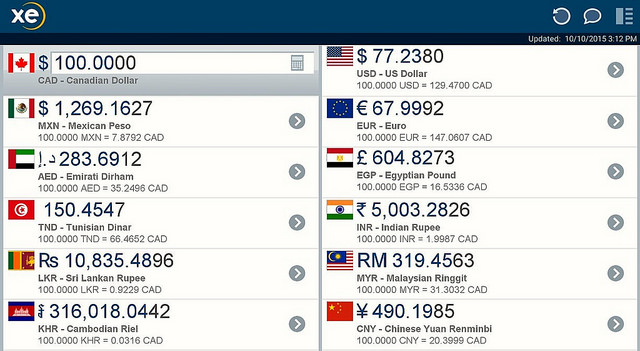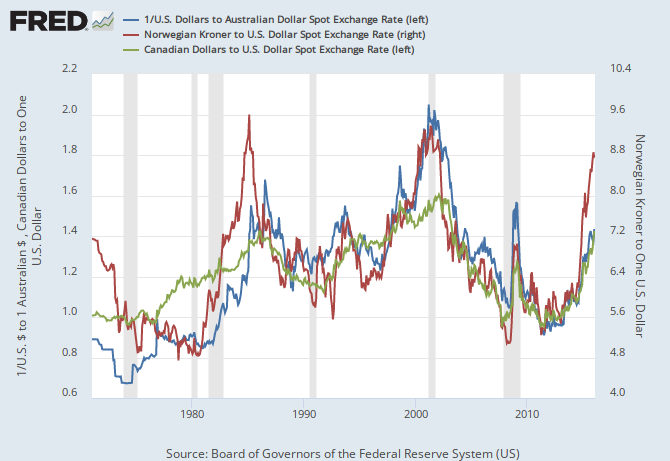
I get letters from all over the world. ?Here is a recent one:
Respected Sir,
Greetings of the day!
I read your blog religiously and have gained quite a lot of practical insights in financial field. Your book reviews are very helpful and impartial.
I request you to write blog post on dollar pegs in Middle East and under what conditions those dollar pegs would fall.
If in case you cannot write about it, kindly point me to some material which can be helpful to me.
Thanks for your valuable time.
Now occasionally, some people write me and tell me that I am outside my circle of competence. ?In this case I will admit I am at the edge of that circle. ?But maybe I can say a few useful things.
Many countries like pegging their currency to the US dollar because it provides stability for business relationships as businesses in their country trade with the US, or, with other countries that peg their US dollar, or, run a dirty peg of a controlled devaluation. ?Let me call that informal group of countries the US dollar bloc. [USDB]
The problem comes when the country trading in?the USDB begins to import a lot more than they export, and in the process, they either liquidate US dollar-denominated assets or create?US dollar-denominated liabilities in order to fund the difference.
Now, that’s not a problem for the US — we get a pseudo-free pass in exporting claims on the US dollar. ?The only potential cost is possible future inflation. But, it is a problem for other countries that try to do so, because they can’t manufacture those claims out of thin air as the US Treasury does.
Now in the Middle East it used to be easy for many countries there because of all the crude oil they produced. ?Crude oil goes out, goods and US dollar claims come in. ?Now it is reversed, as the price of crude is so low. ?Might this have an effect on the currencies of the Middle East. ?Well, first let’s look at some currencies that float that are heavily influenced by crude oil and other commodities: Australia, Canada, and Norway:

As oil and commodities have?traded off so have these currencies. ?That means for pegged currencies the same stress exists. ?But with a pegged currency, if adjustments happen, they are rather large violent surprises. ?Remember the old saying, “He lied like a finance minister on the eve of the devaluation,” or Monty Python, “No one expects the Spanish Inquisition!”
That’s not saying that any currency peg will break imminently. ?It will happen later for those countries with large reserves of hard currency assets, especially the dollar. ?It will happen later for those countries that don’t have to draw on those reserves so rapidly.
Thus my advice is threefold:
- Watch hard currency reserve levels and project future levels.
- Listen to the rating agencies as they downgrade the foreign currency sovereign credit ratings of countries. ?When the ratings get lowered and there is no sign that there will be any change in government policy, watch out.
- Watch the behavior of wealthy and connected individuals. ?Are they moving their assets out of the country and into hard currency assets? ?They always do some of this, but are they doing more of it — is it accelerating?
Point 3 is an important one, and is one seemingly driving currency weakness in China at present. ?US Dollar assets may come in due to an excess of exports over imports, but they are going out as wealthy people look to preserve their wealth.
On point 2, the rating agencies are competent, but read their writeups more than the ratings. ?They do their truth-telling in the verbiage even when they delay downgrades longer than they ought to.
Point 1 is the most objective, but governments will put off adjustments as long as they can — which makes the eventual adjustment larger and more painful for those who are not connected. ?Sadly, it is the middle class and poor that get hit the worst on these things as the price of imported staple goods rise while the assets of the wealthy are protected.
And thus my basic advice is this: gradually diversify your assets into ones that will not be harmed by a devaluation. ?This is one where your government will not look out for your well-being, so you have to do it yourself.
As a final note, when I wrote this piece on a similar topic, the country in question did a huge devaluation shortly after it was written. ?Be careful.

Am relieved to find your must-read posts back on line. Best wishes for a prosperous 2016.